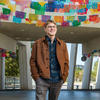A personal journey
In some ways, Voisine could understand the road his interviewees traveled. Growing up gay in a small New England town, Voisine felt a certain sense of alienation. There was little in his surroundings that celebrated or even recognized his identity.
That changed when he came to Temple. The vibrant urban landscape and diverse student body offered safety and opened his eyes to a wider world. Yet, he still saw gaps: About 15% of Temple’s student body is international, but he saw they had limited opportunities to interact with U.S. citizens.
So, Voisine helped found Freely, an online journal dedicated to the international student experience, as well as Temple Refugee Outreach, a student organization dedicated to supporting refugees living in Philadelphia.
“My migration to Temple is what pushed me to think about what migrating and moving means for others,” Voisine said. “We all experience movement.”
The road ahead
After publishing his Mexico City research in a 175-page paper written entirely in Spanish, though English is his native language, Voisine stayed in Mexico for an additional year, consulting for the United Nations Development Program. He aimed to replicate at a government level the success that nonprofit migrant support groups have in protecting the safety of LGBTQ+ migrants—by developing best practices in protecting their data and gaining trust.
For his demonstrated academic excellence, commitment to improving the lives of others and capacity for leadership, Voisine was named a finalist for Stanford’s Knight-Hennessy award and a recipient of the prestigious Gates Cambridge Scholarship—Temple’s first.
He ultimately declined the Gates Cambridge award to pursue his PhD at the University of Texas at Austin, where he’s studying the experience of refugees in Mexico throughout the 20th century.
Particularly interested in the voices of LGBTQ+ writers and filmmakers, he seeks to flip the script. “What can we learn from the critiques they offer of Mexican society?” Voisine’s inquiry prompts us to ask.



